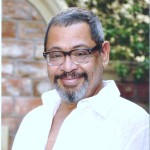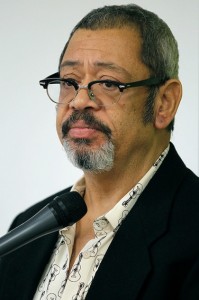Today is National HIV and Aging Awareness Day (NHAAAD), celebrated each year on September 18th to mark the unique challenges of being an elder with HIV. The following is a speech given by Herbie Taylor at our May 7th WHCOA Town Hall in Los Angeles, CA. For more information on NHAAAD, visit our HIV and Aging webpage, or join us for a free webinar on Monday, September 21st from 2-3pm EDT with Grantmakers in Aging.
—-
 By Guest Contributor, Herbie Taylor. Herbie is a 63-year-old Gay man of color who is retired, disabled, sober for 18+ years, a survivor of HIV/AIDS for 25+ years, and who is, at the moment, in cancer remission. He wakes up happy and grateful every single day.
By Guest Contributor, Herbie Taylor. Herbie is a 63-year-old Gay man of color who is retired, disabled, sober for 18+ years, a survivor of HIV/AIDS for 25+ years, and who is, at the moment, in cancer remission. He wakes up happy and grateful every single day.
He is a resident of West Hollywood, California, a singer, a writer, and is an active member of the Los Angeles LGBT Center’s Senior Services Department.
Herbie is an advocate for, and very much looks forward to, the establishment of significant, greatly needed services and programs for those Elders in Los Angeles (and everywhere) living with HIV/AIDS.
From the first known cases of the AIDS epidemic in 1980 until the mid-1990s, most people diagnosed with AIDS faced certain death within a few years, if not sooner.
With the advance of effective new medications, HIV has become a more manageable disease, which is evidenced by the ever increasing numbers of older people living with HIV.
The American Psychological Association published an article by Dr. Stephen Karpiak in their January 2014 Psychology and AIDS Exchange Newsletter, which estimates that by the end of this year, 50 percent of all people in the U.S. living with HIV are expected to be age 50 and older. By the year 2020, Dr. Karpiak expects that number to increase to a staggering 70 percent.
Many older gay men grew up in an era of extreme discrimination and stigma. As a result, they may not always disclose their sexual orientation to their doctors.
But it is not just older gay men who are affected by the stigma and shame brought on by an HIV diagnosis.
Some older people – of all genders and sexual orientations – become more sexually active later in life, after a spouse or long-time partner has passed away, and, because of the lack of education about the disease, do not generally think of themselves as high-risk.
Another very real concern is that their physicians sometimes don’t think of them as complete people with healthy sex drives and therefore, they are not tested for HIV.
Some of the symptoms of HIV infection resemble those of conditions associated with the normal aging process, so, by the time all other possibilities have been exhausted and these mature people are finally tested for HIV, it is many times an AIDS diagnosis that they receive.
By the way, the CDC, in its “STD & HIV Screening Recommendations” (which was updated on December 16, 2014) recommends that — and this is verbatim — “All adults and adolescents from ages 13 to 64 should be tested at least once for HIV.” REALLY? ONCE? And only to age 64?
It sounds to me like the CDC thinks that people stop having sex at 64! (I guess I’d better hurry up and find me a husband, cuz it seems like the CDC is saying that I only have two more years to get my swerve on!)
Getting older people who are diagnosed HIV positive into treatment as early as possible is imperative. Doing so will not only save the health care system money in the long run, but, and MUCH more importantly, will SAVE LIVES.
I don’t have to tell you that, here in Los Angeles, youth is the coin of the realm. EVERYTHING is ALL about the young.
Sadly, the same holds true when it comes to services provided for people living with HIV.
Long Term Survivors of HIV, as well as the more mature Newly Diagnosed, have just not been a priority.
There are services and activities for ALMOST every sub-group of the HIV positive population in the LA area, from ethnic group breakdowns to sexual orientation.
There was virtually NOTHING that I could find in my research for which OLDER people with HIV in Los Angeles are the target demographic, not even the three support groups that I already know about!
I was the peer facilitator for one of these support groups for four years, and I just gotta say: if you can get up to 25 gay men – into a church hall – on a Friday night – in Los Angeles – I’d say we really NEEDED that group.
Now, we don’t want to take anything away from any of those people in any of those other demographic groups.

Herbie speaking at our May 7th Town Hall in Los Angeles, CA.
BUT WE DO WANT
AND WE DO NEED
AND WE DO DESERVE
MORE — MUCH MORE —
THAN THREE SUPPORT GROUPS!
WE MATTER!
I am not a Healthcare Provider.
I am not a Program Director.
I am not a Social Worker.
What I AM is a consumer.
WHAT I AM is a consumer with NOTHING to consume.
Many younger people living with HIV — and their providers — may not remember, or may not have even been around, to witness the devastation that ravaged communities around the world, or to watch as we experienced the horrendous side-effects of the early medications, or to see us having to find some way to deal with the soul-shattering grief of watching so many of our loved ones die in such excruciating pain.
But they all DO need to recognize that because WE were THERE, THEY can be HERE.
The survivors of those horrible early years are not worthless relics to be discarded and forgotten, but are to be recognized as invaluable treasures, and to be acknowledged and celebrated for the true CHAMPIONS they are.
I am so grateful to have had this opportunity to bring some of the concerns of the aging HIV positive community to the attention of this meeting.
I extend a big thank you to Dr. Kathleen Sullivan, Director of the Senior Services Department of the Los Angeles LGBT Center, for asking me to speak to you today.
It is my sincere hope that these words have not fallen on deaf ears, and that meaningful steps are taken by the 2015 White House Conference on Aging to address these very real concerns.
Inaction on this exceedingly important, time sensitive issue, will guarantee that the ever-expanding numbers of older people living with HIV/AIDS – who are in dire need of help all over these United States of America – will remain unserved and neglected for 10 MORE years.
AND WE JUST DO NOT HAVE THE TIME.
Thank you.
The opinions expressed in this article are those of the author and do not necessarily reflect those of the Diverse Elders Coalition.

